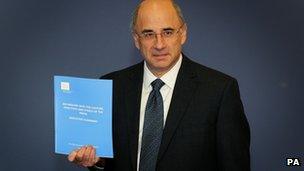Parties say Tory post-Leveson plan 'basis for talks'
- Published
- comments

Lord Justice Leveson's report was published in November
Labour and the Lib Dems have cautiously welcomed Tory plans for a new press regulator backed by royal charter in the wake of the Leveson inquiry.
The plan proposes a regulator with a royal charter, external supervised by a "recognition panel".
The Lib Dems said the ideas were a starting point for talks, while Labour indicated there was a prospect of a deal if changes were made.
David Cameron had rejected a new system underpinned by statute.
The Tories say their plans mean legislation, as proposed by Lord Leveson, is not required.
The plans have been posted on the Department of Culture website, but make clear they are being published "outside of the normal arrangements for collective agreement, and [do] not reflect an agreed position between the Conservative and Liberal Democrat parties".
The Lib Dems did not rule out the royal charter proposals. A spokesman said: "We have always said our preferred option is to implement what Leveson suggested - a system of independent self-regulation backed by statute.
"But we are also clear that, as both Leveson and the victims have called for, the best outcome would be to move forward with cross-party agreement."
Lord Fowler and Liberal Democrat MP John Hemming on the Leveson Report and plans for a royal charter
Deputy Labour leader Harriet Harman raised a number of issues with the proposals, but said the royal charter framework would form the basis of cross-party talks scheduled for Thursday.
She also suggested a target date of 21 February for reaching an agreement.
"The Leveson Report was published on November 29," she said. "We need to make progress on implementing its recommendations."
In November the report on press standards, external by Lord Justice Leveson, commissioned in the wake of the phone-hacking scandal, recommended an independent, self-regulatory watchdog for the press that would be backed by legislation.
Consensus sought
But Prime Minister David Cameron said he did not believe a bill was necessary to set up the new regime and, instead, the Conservatives say a royal charter is the right way to provide legal backing for any new press regulator.
Culture Secretary Maria Miller told the BBC cross-party talks, which have so far failed to reach an agreement, would continue as it was "important to get consensus" on this.
Royal charters are formal documents that have been used to establish and lay out the terms of organisations, including the BBC and the Bank of England, and cannot be changed without government approval.
Under the Conservative plans, the charter could only be amended by the recognition body if the leaders of the three main political parties in the House of Commons agreed and any changes were approved in Parliament.
If the Privy Council wanted to make changes to the charter it would not have to get the approval of the leaders of the three main political parties.
'Complex issues'
The independent self-regulatory body would be governed by an independent board "appointed in a genuinely open, transparent and independent way, without any direction from industry or influence from government".
The board itself would be made up of a majority of people who were independent of the press but include a sufficient number of people with experience of the industry such as former editors and senior or academic journalists. Serving editors, current MPs or government ministers would be excluded.
Under the proposals, news websites published by both newspapers and other companies would fall under the remit of the press regulator for the first time.
The Society of Editors said it was studying the royal charter proposal "because achieving a Leveson-compliant self-regulatory system is full of complex practical and legal issues."
Executive director Bob Satchwell said: "Lord Justice Leveson was at pains to point out that most of the press has been found guilty of nothing, but the tough new regulatory system and the royal charter plan are massive changes."
'Very disappointed'
Campaign group Hacked Off earlier published its own draft bill, which it says would implement the recommendations of the Leveson report in full.
It said it was "very disappointed indeed" with what appeared to be a series of concessions to the press.
Hacked Off director Brian Cathcart said: "All the elements suggest that the press have been given concessions and that the minister has put the interests of the press before the interests of the public...
"The loser is the British public. The loser is all the people who stand in future to be victims of the kinds of things, the kind of abuses, that caused the Leveson Inquiry in the first place."
National newspaper editors held a series of meetings in the wake of the Leveson report's publication and agreed to put most of its proposals for self-regulation in place. But they resisted statutory underpinning or an auditing role for another statutory body.